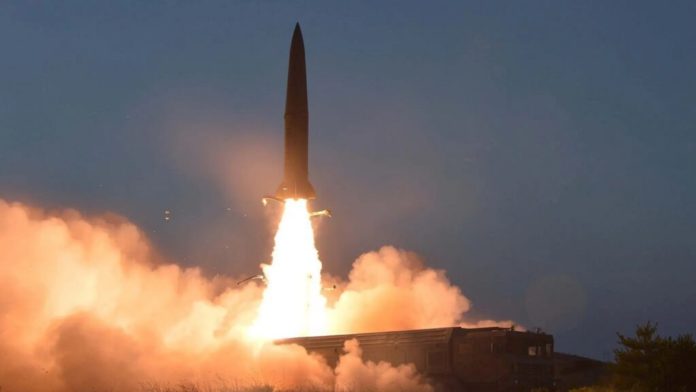This article was originally published on 1945.
North Korea’s New Ballistic Missile Test: How Should the Alliance Respond? At the end of the Worker’s Party of Korea 4th Plenary Meeting of the party’s 8th Central Committee, the party issued a statement with some 18,400 words, none of which included a reference to the hostile policy of the regime, or the perceived hostile policies of the ROK/U.S. Alliance. The summary of the entire message appears to be a focus on domestic issues of the economy, food shortages, and COVID-19 defense by strengthening the regime’s ideological efforts to control the Korean people in the face of severe hardship. There was a single national security and foreign policy-related sentence in the statement: “The increasingly unstable military environment on the Korean Peninsula and international politics have instigated calls to vigorously push forward with our national defense build-up plans without any delay.”
On January 5th Kim Jong-un “vigorously pushed forward” with his ongoing military development plans by testing a ballistic missile with a launch into the East Sea between Korea and Japan. It is too soon to assess the details of the missile launch, but it is likely Kim Jong-un is trying to send a message. The specific message could be his expression of opposition to the end of war declaration. It could be a warning to the alliance to leave the regime alone while the regime focuses on internal problems. It could be Kim attempting to be a spoiler in strategic competition to affect relations among the U.S., China, ROK, and Japan. Most likely, it could be simply another page from the seven decades old Kim family regime provocation playbook. This last would likely be to try to convince the U.S. to offer concessions such as sanctions relief for a return to denuclearization negotiations. The usual blackmail diplomacy.
North Korea’s Missile Test: A Framework for How to Respond
The key question that is asked with every North Korean action is how should the ROK/U.S. alliance respond?
Policymakers should keep in mind that the Kim family regime’s political warfare strategy relies heavily on its blackmail diplomacy – the use of increased tension, threats, and provocations to gain political and economic concessions. Part of an information and influence strategy should be to counter the criticism that a North Korean provocation is a US and South Korean policy failure.
The ROK and U.S. should make sure the press, pundits, and public understand that this is a fundamental part of North Korean strategy and that it conducts provocations for specific objectives. It does not represent a policy failure; it represents a deliberate policy decision by Kim Jong-un to continue to execute his political warfare strategy.
To read more, please click here.
David Maxwell is a senior fellow at FDD. He is a 30-year veteran of the United States Army, retiring in 2011 as a Special Forces Colonel with his final assignment serving on the military faculty teaching national security strategy at the National War College.


